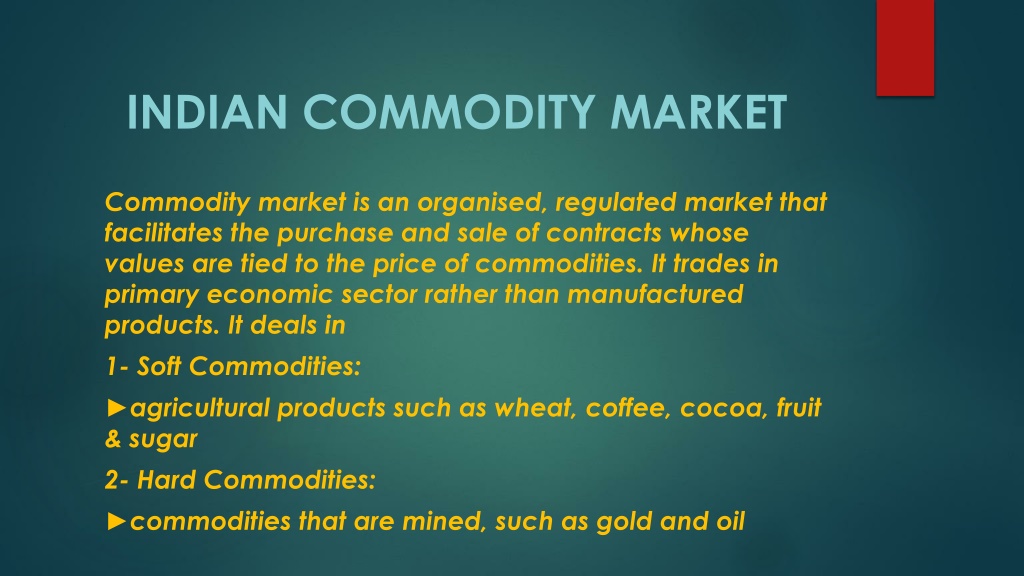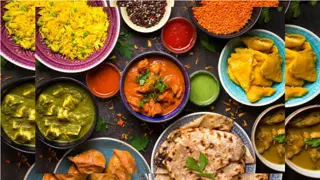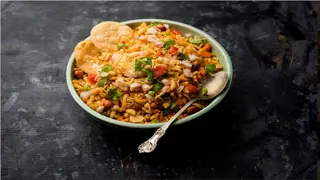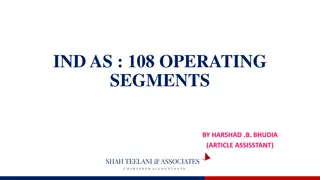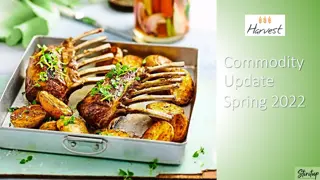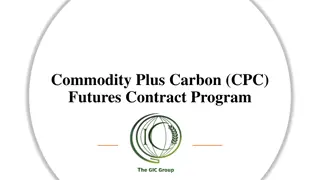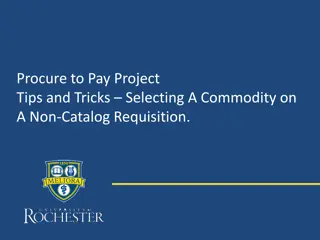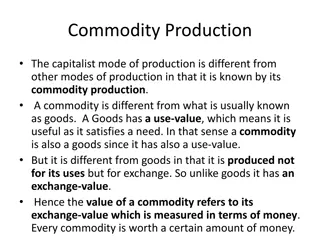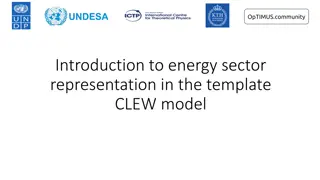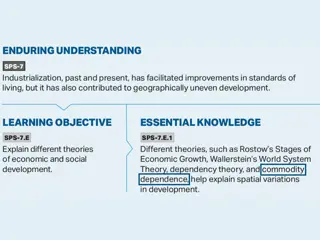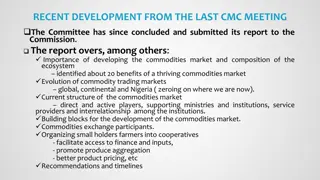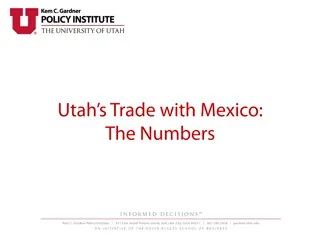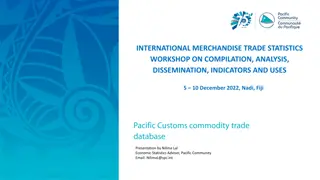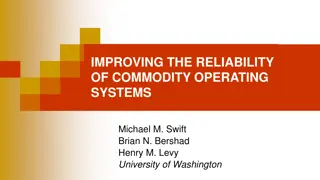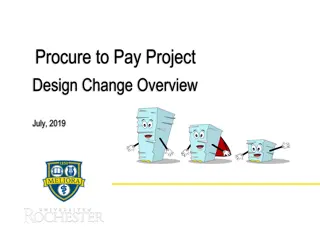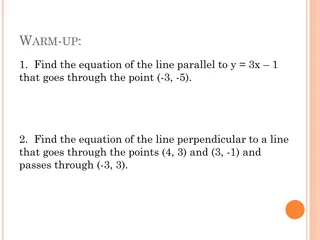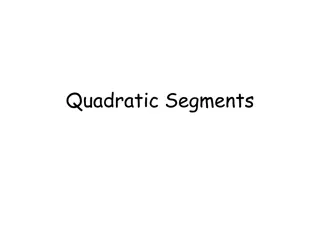Understanding the Indian Commodity Market: Participants, Segments, and Structure
The Indian Commodity Market is a vital part of the economy, comprising participants like hedgers, speculators, and arbitrageurs. It operates through segments such as the derivatives, spot, and futures markets, facilitated by entities like the Ministry of Finance and Commodity Exchanges. The transaction process involves various steps from order placement to trade execution. This regulated market deals with both soft and hard commodities, offering avenues for managing risks and earning profits.
Download Presentation

Please find below an Image/Link to download the presentation.
The content on the website is provided AS IS for your information and personal use only. It may not be sold, licensed, or shared on other websites without obtaining consent from the author. Download presentation by click this link. If you encounter any issues during the download, it is possible that the publisher has removed the file from their server.
E N D
Presentation Transcript
INDIAN COMMODITY MARKET Commodity market is an organised, regulated market that facilitates the purchase and sale of contracts whose values are tied to the price of commodities. It trades in primary economic sector rather than manufactured products. It deals in 1- Soft Commodities: agricultural products such as wheat, coffee, cocoa, fruit & sugar 2- Hard Commodities: commodities that are mined, such as gold and oil
PARTICIPANTS IN COMMODITY MARKET 1- HEDGERS User of market who enters into future contract to manage the risk of adverse price fluctuation in respect of his existing or future assets producers Farmers consumers Refineries, Food Processing companies 2- SPECULATORS Trader who trades or takes position without having exposure in the physical market, with the sole intention of earning profit Institutional proprietary traders brokerage houses spot commodity traders 3- ARBITRAGEURS It refers to the simultaneous purchase and sale in two markets so that the selling price is higher than the buying price more than the transaction cost to earn riskless profit brokerage houses investors
SEGMENTS OF INDIAN COMMODITY MARKET DERIVATIVES MARKET SPOT MARKETS FUTURES MARKET A buyer and seller trade physical commodities directly in spot market. This segment of commodities utilises financial instruments such as futures, options and swaps for trading commodities through commodity exchanges It is contract that records a predetermined purchase or sale of a specific quantity of goods at a future date at specific price Delivery of goods is immediate and through cash/bank Local mandi, retail market, wholesale market & similar set ups belong to spot market
STRUCTURE OF INDIAN COMMODITY MARKET Ministry of Finance(GOI) Forward Market Commission Commodity Exchanges National Exchanges Regional Exchanges MCX NCDEX NMCE ICEX Other Regional Exchanges
PROCESS OF COMMODITY MARKET TRANSACTION 1- The buyer or seller of a futures contracts(s) calls a commodities broker and places an order. 2- The commodities broker relays the order to a desk clerk on the floor of a commodities exchange. 3- The desk clerk relays the order to a floor broker standing in the pit where the particular commodity trades. 4- The floor broker executes the trade on behalf of the customer with another floor broker or with a market player(a trader that provides liquidity for brokers). 5- The floor broker informs the desk clerk when the trade is executed. 6- The desk clerk informs the commodities broker. 7- The commodities broker informs the customer.
COMMODITY FUTURES A financial contract The underlying commodity is bought or sold at a future date A tool used by investors, hedgers, arbitrageurs, day traders
Precious Metals: Base Metals: AGRI PRODUCTS: - Jeera Gold Copper - - Silver Nickel - Pepper - - Platinum Lead - - - Chilli Zinc - - Turmeric Aluminum - - Guar Seed Tin - - Guar Gum Energy: - - Soya Bean sugar Crude Oil - - Natural Gas - - Maize
OTHER INFORMATION Exchange Timings:- Agri Products:10:00 AM to 5:00 PM Other Commodities: 10:00 AM to 11:30 PM Instrument Traded: Future Contracts Expiry of Contracts: Different for different commodities
MAJOR COMMODITY EXCHANGES IN INDIA MULTI COMMODITY EXCHANGE OF INDIA (MCX): ESTABLISHED IN 2003 FACILITATES TRADING ACROSS VARIOUS SEGMENTS FIRST LISTED EXCHANGE OF INDIA MAJOR COMMODITY EXCHANGE OF INDIA ENJOYS MARKET SHARE AROUND 90% NATIONAL COMMODITY AND DERIVATIVES EXCHANGE LTD. (MCDEX): FOUNDED IN 2003 A PUBLIC LISTED COMPANY COMPRISES AROUND 25% OF MARKET SHARE NATIONAL MULTI COMMODITY EXCHANGE OF INDIA (NMCE): FOUNDED IN 2002 DEALS IN COMMODITY FUTURES CONTRACTS THIRD LARGEST INDIAN COMMODITY EXCHANGE INDIAN COMMODITY EXCHANGE OF INDIA (ICEX): SEBI REGULATED ONLINE COMMODITY DERIVATIVE EXCHANGE OFFERS FUTURE CONTRACTS IN DIAMOND HELPS USERS TO BENEFIT FROM OPPORTUNITIES OF HEDGING, RISK MANAGEMENT, AND SUPPLY CHAIN MANAGEMENT WORKS ON DISASTER RECOVERY(DR) SITE WITH ZERO DATA LOSS IN CASE OF EXIGENCIES REGIONAL EXCHANGES
INTERNATIONAL COMMODITY EXCHANGES 1-THE NEW YORK MERCANTILE EXCHANGE(NYMEX) 2-LONDON METAL EXCHANGE 3-THE CHICAGO BOARD OF TRADE 4-TOKYO COMMODITY EXCHANGE(TOCOM) 5-CHICAGO MERCANTILE EXCHANGE
